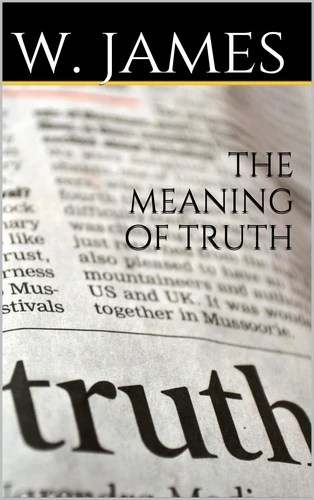The Meaning of Truth
Par :Formats :
Disponible dans votre compte client Decitre ou Furet du Nord dès validation de votre commande. Le format ePub est :
- Compatible avec une lecture sur My Vivlio (smartphone, tablette, ordinateur)
- Compatible avec une lecture sur liseuses Vivlio
- Pour les liseuses autres que Vivlio, vous devez utiliser le logiciel Adobe Digital Edition. Non compatible avec la lecture sur les liseuses Kindle, Remarkable et Sony
 , qui est-ce ?
, qui est-ce ?Notre partenaire de plateforme de lecture numérique où vous retrouverez l'ensemble de vos ebooks gratuitement
Pour en savoir plus sur nos ebooks, consultez notre aide en ligne ici
- Nombre de pages228
- FormatePub
- ISBN978-3-7481-9090-5
- EAN9783748190905
- Date de parution23/01/2019
- Protection num.Digital Watermarking
- Taille433 Ko
- Infos supplémentairesepub
- ÉditeurBooks on Demand
Résumé
THE pivotal part of my book named Pragmatism is its account of the relation called 'truth' which may obtain between an idea (opinion, belief, statement, or what not) and its object. 'Truth, ' I there say, 'is a property of certain of our ideas. It means their agreement, as falsity means their disagreement, with reality. Pragmatists and intellectualists both accept this definition as a matter of course.
'Where our ideas [do] not copy definitely their object, what does agreement with that object mean? ...
Pragmatism asks its usual question. "Grant an idea or belief to be true, " it says, "what concrete difference will its being true make in any one's actual life? What experiences [may] be different from those which would obtain if the belief were false? How will the truth be realized? What, in short, is the truth's cash-value in experiential terms?" The moment pragmatism asks this question, it sees the answer: TRUE IDEAS ARE THOSE THAT WE CAN ASSIMILATE, VALIDATE, CORROBORATE, AND VERIFY.
FALSE IDEAS ARE THOSE THAT WE CANNOT. That is the practical difference it makes to us to have true ideas; that therefore is the meaning of truth, for it is all that truth is known as.
Pragmatism asks its usual question. "Grant an idea or belief to be true, " it says, "what concrete difference will its being true make in any one's actual life? What experiences [may] be different from those which would obtain if the belief were false? How will the truth be realized? What, in short, is the truth's cash-value in experiential terms?" The moment pragmatism asks this question, it sees the answer: TRUE IDEAS ARE THOSE THAT WE CAN ASSIMILATE, VALIDATE, CORROBORATE, AND VERIFY.
FALSE IDEAS ARE THOSE THAT WE CANNOT. That is the practical difference it makes to us to have true ideas; that therefore is the meaning of truth, for it is all that truth is known as.
THE pivotal part of my book named Pragmatism is its account of the relation called 'truth' which may obtain between an idea (opinion, belief, statement, or what not) and its object. 'Truth, ' I there say, 'is a property of certain of our ideas. It means their agreement, as falsity means their disagreement, with reality. Pragmatists and intellectualists both accept this definition as a matter of course.
'Where our ideas [do] not copy definitely their object, what does agreement with that object mean? ...
Pragmatism asks its usual question. "Grant an idea or belief to be true, " it says, "what concrete difference will its being true make in any one's actual life? What experiences [may] be different from those which would obtain if the belief were false? How will the truth be realized? What, in short, is the truth's cash-value in experiential terms?" The moment pragmatism asks this question, it sees the answer: TRUE IDEAS ARE THOSE THAT WE CAN ASSIMILATE, VALIDATE, CORROBORATE, AND VERIFY.
FALSE IDEAS ARE THOSE THAT WE CANNOT. That is the practical difference it makes to us to have true ideas; that therefore is the meaning of truth, for it is all that truth is known as.
Pragmatism asks its usual question. "Grant an idea or belief to be true, " it says, "what concrete difference will its being true make in any one's actual life? What experiences [may] be different from those which would obtain if the belief were false? How will the truth be realized? What, in short, is the truth's cash-value in experiential terms?" The moment pragmatism asks this question, it sees the answer: TRUE IDEAS ARE THOSE THAT WE CAN ASSIMILATE, VALIDATE, CORROBORATE, AND VERIFY.
FALSE IDEAS ARE THOSE THAT WE CANNOT. That is the practical difference it makes to us to have true ideas; that therefore is the meaning of truth, for it is all that truth is known as.






















